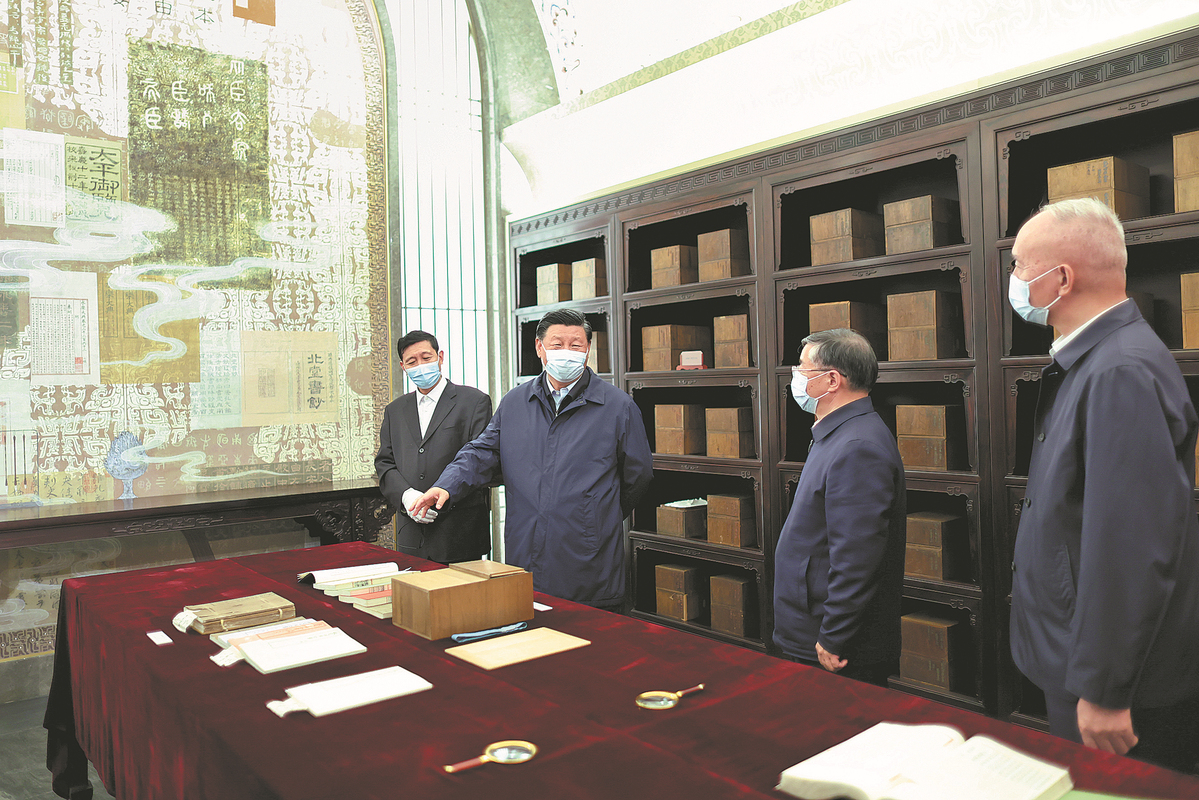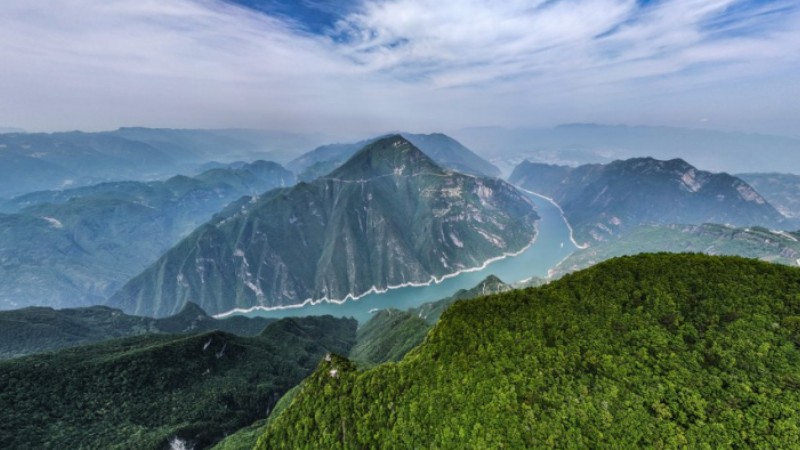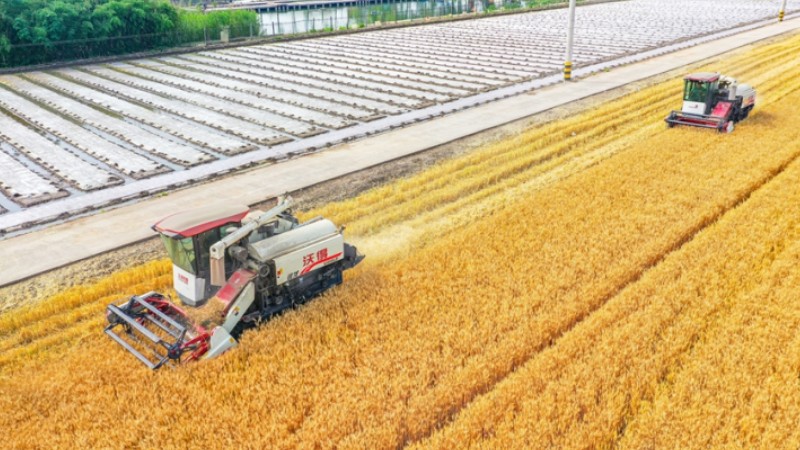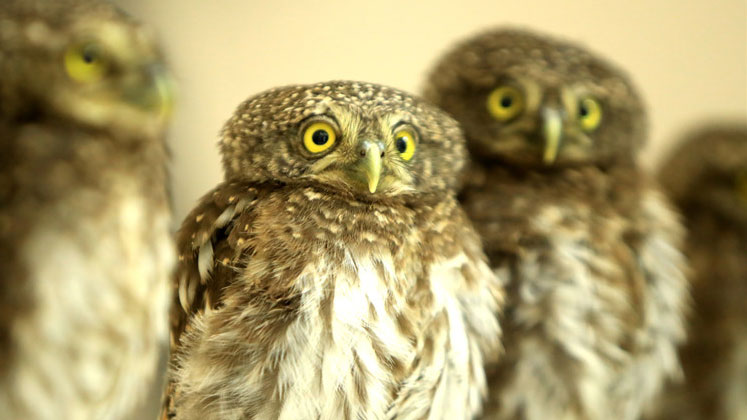Nation urged to build strength from traditions

President Xi Jinping, who is also general secretary of the Communist Party of China Central Committee and chairman of the Central Military Commission, inspects the China National Archives of Publications and Culture in Beijing on Thursday. He underlined the importance of shouldering new cultural missions and building a modern Chinese civilization at a symposium on cultural inheritance and development at the Chinese Academy of History on Friday. [Photo/Xinhua]
Analysts hail president's call for boosting unity, cultural confidence
The vision put forward on Friday by President Xi Jinping to build a modern Chinese civilization will empower the nation on its own pathway to modernization and build up national unity in the face of various risks and challenges, according to analysts.
During a symposium with officials and experts in Beijing, Xi, who is also general secretary of the Communist Party of China Central Committee and chairman of the Central Military Commission, expounded on the need to firm up confidence among the Chinese people in their history and culture, and to use Chinese wisdom to summarize Chinese experience and transform it into Chinese theory, in order to achieve "spiritual independence and autonomy".
Experts said that the building of a modern Chinese civilization and carrying forward China's fine traditional culture will help shore up Beijing's narrative against dominance by Western countries in social sciences and translate the traditional culture into strengths for the nation's future development.
He Yun'ao, a professor who researches history and traditional cultural heritage at Nanjing University, said that by emphasizing the building of a modern Chinese civilization, the Chinese president has reiterated the need to pool strength from China's traditional culture, which spans 5,000 years.
"For China to attain its great rejuvenation will require advancement both at the material and cultural-ethical level. The president has made it clear that to build China into a cultural powerhouse, the priority must be to further explore the strength of its traditional culture," he said.
Xi has characterized the key elements of fine Chinese traditional culture in five aspects, lauding Chinese civilization for its continuity, innovative nature, unity, inclusiveness and peaceful nature.
The peaceful nature of Chinese civilization determines that China will continue to build world peace, contribute to global development and safeguard the international order, and that it will continue to pursue exchanges and mutual learning among civilizations rather than cultural hegemony, he said.
Professor He said that by underscoring the inclusive and peaceful nature of Chinese civilization, Xi has conveyed the message to the international community that Beijing will remain committed to its national strategy of opening-up and championing global peace and development.
Meanwhile, by pointing out that Chinese civilization is characterized by its unity in nature, the Chinese president has reiterated the warning that since national unity will always be at the heart of China's core interests, separatist activities will not be tolerated, the professor said.
Liu Qingzhu, former director of the Chinese Academy of Social Sciences' Institute of Archaeology, said that Xi has emphasized the importance for China, a nation with 56 ethnic groups, to pool the strength from history and its traditional culture in enhancing its unity and strengthening the sense of community for the nation.
"For China, a key source of its strength lies in its inexhaustible traditional culture, which can be applied on a daily basis," he said.
He said that another highlight of the vision laid out by Xi at Friday's symposium is his elaboration on integrating the basic tenets of Marxism with China's realities and its fine traditional culture.
Xi underscored during the meeting that integrating the basic tenets of Marxism with China's traditional culture has made it possible to make full use of the precious resources of traditional Chinese culture in a broader cultural space in exploring theoretical and institutional innovation for the future.
Liu said the integration of Marxism with China's traditional culture will pave the way for the building of China's own discourse system on civilization and help the nation firm up its confidence amid the complex international landscape.
Some experts have underlined the significance of Xi's vision on civilization in powering Chinese modernization, which also requires material and cultural-ethical advancement.
Fan Di'an, chairman of the Chinese Artists Association and dean of the Central Academy of Fine Arts, said the Chinese path to modernization will be an opportunity to usher in another leap ahead for Chinese civilization.
Meanwhile, Chinese civilization will help propel the nation's modernization from the cultural level, he said.
Before the symposium on Friday, the president made fact-finding trips to the China National Archives of Publications and Culture and the Chinese Academy of History, inspecting collections of historical documents and exhibitions of cultural relics.
Professor He said that one of the reasons Xi has placed so much emphasis on the preservation and study of China's cultural heritage in recent years is to explore resources from traditional culture to guide the nation's paths, enrich the people's spiritual world and empower innovation.
"Exploring the past will help explain where the Chinese characteristics come from and where they are headed," he said. "Doing so will also provide the mental strength required to build a modern Chinese civilization."
Photos
Related Stories
Copyright © 2023 People's Daily Online. All Rights Reserved.









